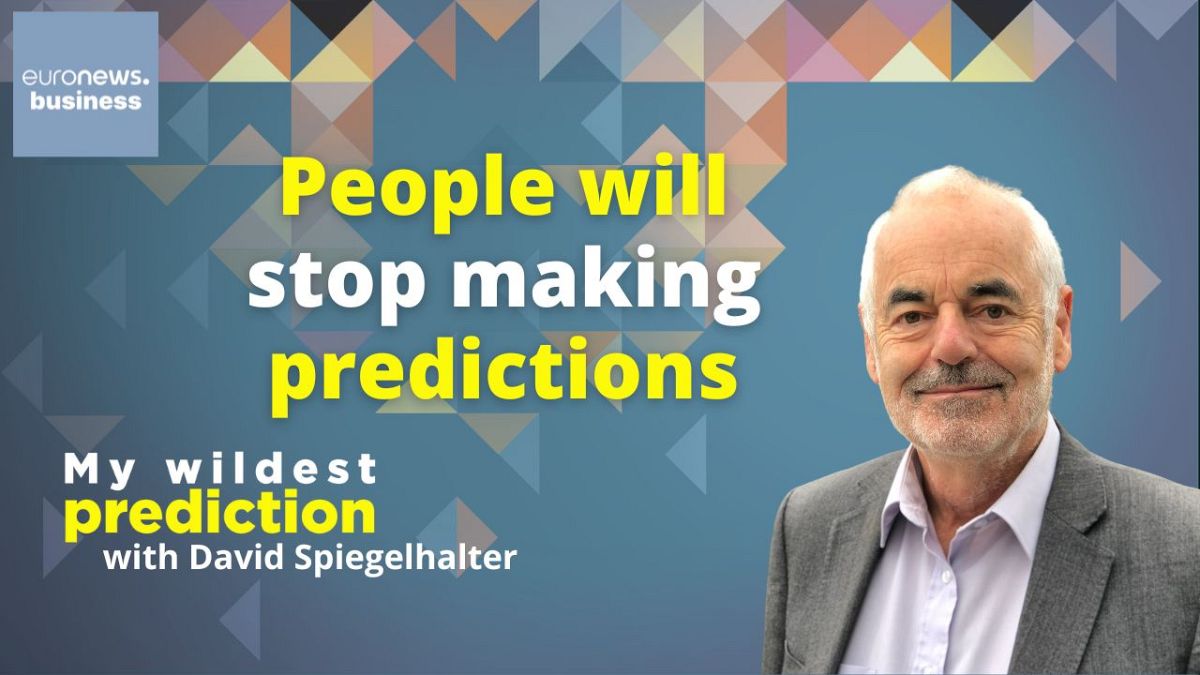Can probabilities help people prepare for the future? According to statistician David Spiegelhalter, yes—but only if they have been carefully examined through mathematical analysis.
My Wildest Prediction is a podcast series from Euronews Businesswhere we dare to imagine the future with business and tech visionaries. In this episode, Tom Goodwin talks to Professor David Spiegelhalter, an Emeritus professor of statistics at the University of Cambridge, who is committed to making mathematics more accessible.
People make predictions all the time about a lot of things, from weather changes to the next most profitable industries and the upcoming election results. People love calculating probabilities and finding patterns that help them forecast and prepare for the future accordingly. But how effective are these predictions?
According to David Spiegelhalter, the emeritus professor of statistics in the Centre for Mathematical Studies at the University of Cambridge, these predictions can only help us deal with uncertainty if backed by mathematical thinking.
David Spiegelhalter dives into this topic in his latest book: The Art of Uncertainty: How to Navigate Chance, Ignorance, Risk and Luck. Spiegelhalter joins My Wildest Prediction to share his insights on people’s perception of risk, and how people can benefit from a better understanding of numbers and probabilities.
The idea of probability and predicting the future
“My wildest prediction is that people will stop making predictions,” David Spiegelhalter told Euronews.
According to the statistician, probabilities are just constructions. For example, when someone calculates the chance of rain for the next day, they are quantifying an assessment that is non-existent in real life.
“Probability is not natural. We just made it up in the mid-1600s,” Spiegelhalter explained.
“It’s very useful to pretend it exists. When we get into big numbers or small numbers, it stops working,” he added.
According to the Cambridge academic, however, there are some probabilities that can be more useful than others to deal with uncertainty. Talking to Euronews, he stressed the importance of mathematical thinking. He explained that he prefers predictions to be accompanied by rough percentage values, so people have a clearer sense of how likely an outcome actually is.
The art of uncertainty
According to Spiegelhalter, probabilities and logic can also help us view uncertainty, an inevitable condition which defines human experience, in a somewhat positive way.
“I can’t hear anything worse than knowing what was going to happen all the time,” Spiegelhalter told Tom Goodwin.
The professor noted that the world we now live in now is more uncertain than it previously was.
“When I got out of university, which of course was completely free, I could almost choose which job I was going to go into, and I could stay in that job. I stayed in the same job for 32 years,” he explained.
Describing today’s rapidly changing world, he said: “Now, people would change jobs so much more often. A lot of insecurity, job insecurity.”
In these unpredictable scenarios, David Spiegelhalter underlined the value of humility and recognising one’s inability to foresee the future.
“We could see in the Covid pandemic, there was a huge uncertainty at the beginning, and yet some people just gave their opinion with absolute confidence.”
Use of AI in decision-making
Spiegelhalter suggested that while political polarisation has long existed, social media has intensified this trend in everyday discourse. In terms of a public conversation, he sees virtual platforms contributing to division rather than constructive dialogue.
Spiegelhalter argued that artificial intelligence tools, which are becoming increasingly integrated into daily life, are more moderate than social media platforms in this respect. In particular, he noted that he appreciates AI’s capability of admitting mistakes.
“The AI programs I use are invariably polite,” he said. “They’re like talking to a very reasonable person.”
“In my profession, as in so many professions, we’ve just got to learn to use it in the best, appropriate way,” he said.
Despite his enthusiasm, Spiegelhalter is aware of the threat AI can pose and believes it cannot entirely substitute mathematical thinking.
“For generating ideas, for summarising reports, for coding, [AI] is brilliant and all of that. But for factual matters, you’ve got to check it,” he said.

